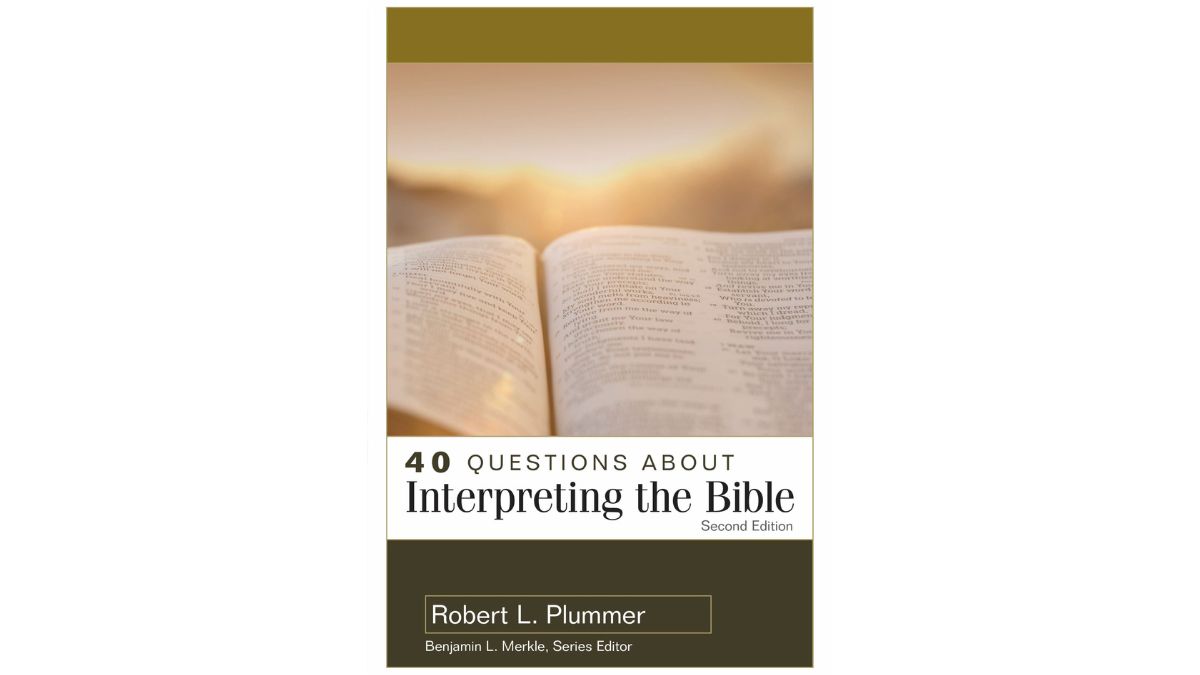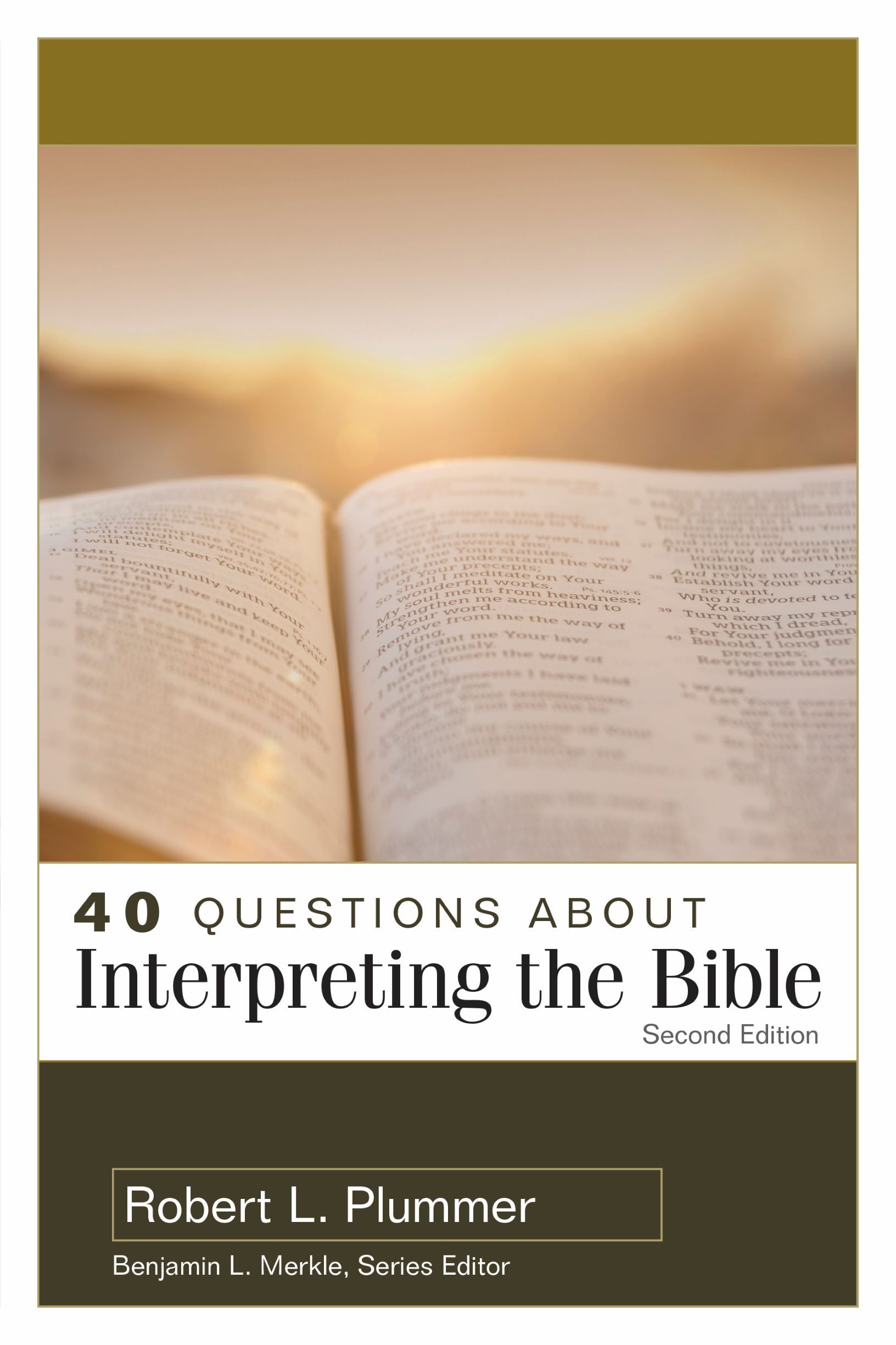40 Questions About Interpreting the Bible
The book explains to everyday Christians what is the Bible, how we got it, and how to interpret the Bible and grasp its divine intended meaning.

40 Questions About Interpreting the Bible is a 361 page book written by Robert L. Plummer, and this second edition was published by Kregel Academic in 2021. Plummer may be best known for starting Daily Dose of Greek, an excellent internet resource to help Greek students retain and deepen their knowledge and expertise in Koine Greek. Plummer received his MDiv and PhD degrees from Southern Baptist Theological Seminary, and he continues to serve there as Professor of Biblical Studies.
1. Purpose of 40 Questions About Interpreting the Bible
Not able to find a book that covered in brevity all the topics (canon, transmission, Bible translations, general interpretive questions, literary types in the Bible) in his introductory biblical hermeneutics course, Plummer wrote this book to be used as a "textbook for an introductory Bible course at a college or seminary" or a book for "any curious Christian."
2. Content of 40 Questions About Interpreting the Bible
As part of Kregel Academic's "40 Questions" series (24 books published at the time of this book review), Plummer's contribution to this series follows a similar format. The book contains 40 short chapters with each chapter answering a question that is pertinent to the interpretation of the Bible.
Part I: Text, Canon, and Transmission
- What is the Bible?
- How is the Bible Organized?
- Who wrote the Bible—humans or God?
- Does the Bible contain errors?
- Were the ancient manuscripts of the Bible transmitted accurately?
- Who determines what books would be included in the Bible?
- Which is the best Bible translations?
Part II: General Hermeneutics
- Why is Biblical interpretation important?
- How has the Bible been interpreted throughout church history?
- What are some general principles for interpreting the Bible?
- How can I improve as an interpreter of the Bible?
- What are some helpful books or tools for interpreting the Bible?
- Who determines the meaning of a text?
- Can a text have more than one meaning?
- What is the role of the Holy Spirit in determining meaning?
- What is the overarching message of the Bible?
- Is the Bible really all about Jesus?
- Do all the commands of the Bible apply today?
- Why can't people agree on what the Bible means?
Part III: Specific Hermeneutics
- How do we identify literary Genre—and why does it matter?
- How do we interpret historical narratives?
- How do we interpret prophecy?
- How do we interpret apocalpytic literature?
- How do we interpret exaggerated or hyperbolic language?
- How do we interpret figures of speech?
- How do we interpret Proverbs?
- How do we interpret poetry?
- How do we interpret the Psalms?
- How do we interpret parables?
- How do we interpret letters or epistles?
Part IV: Practical and Current Issues
- What does the Bible tell us about the future?
- How can I use the Bible in daily devotions?
- How can I lead a Bible study?
- Does the Bible teach that Christians will be healthy and wealthy?
- What are some modern-day trends in Biblical Interpretation?
3. Commentary of 40 Questions About Interpreting the Bible
Part I is an excellent 66 page summary of how we got the Bible. The first half covers the Bible timeline, its general themes and storyline (biblical theology), the doctrine of inspiration and dual authorship, and the inerrancy of Scripture. The second half covers how the books of the Old and New Testament were recognized as Scripture (canon) and how the ancient manuscripts were transmitted and translated to give us our English Bibles today.
Part I is my favorite part of the book. It covers the most foundational aspects of the Bible from an evangelical perspective with brevity and clarity. And for readers who are interested in further study, additional books and resources are recommended after each topic/chapter.
Part II covers what is commonly referred to as general hermeneutics. The first half of this section explains why rules and principles for interpreting the Bible are important. It explains the language, history, and cultural gaps we must bridge to understand the original intended meaning. It covers the history of Bible interpretation from the early church to our present time. It reviews practical steps that Bible interpreters must employ and Bible study tools that can be used.
The second half of Part II begins with Plummer arguing that "the original human author's consciously-intended purpose as the final arbiter of meaning." (146) The meaning of the text does not lie outside of the original author's conscious intent, but there can be many implications of which the original author was unaware. Also covered is the necessity of illumination by the Holy Spirit and the overarching theme of the Bible pointing to our Lord Jesus Christ. The tripartite division of the law (civil, ceremonial, and moral) are also explained.
Part II takes up about 110 pages and will help Christians who want to understand the general principles of interpretation without reading more academic writings or textbooks. One of the most important chapters in the book is chapter fourteen where Plummer explains the notion of "original human authorial intent." Without any technical jargon, Plummer titles the chapter, "Who Determines the Meaning of a Text?" and he explains how and why meaning should be determined by the divinely inspired authors and not the modern day reader.
Part III covers the different concepts that apply specifically to the various genres of the Bible. Special attention is given to typology (chapter 24), figures of speech (chapters 25–26), Hebrew poetry and the Psalms (chapters 29–31), and parables (chapters 32–33). For those who are not familiar with the various biblical genres and how to approach each type, this overview provides an excellent introduction to specific hermeneutics.
Part IV covers a few practical matters including how Bible interpretation applies to our personal devotions and our leading of a group Bible study. Chapter 36 glosses briefly on eschatology, and chapter 40 covers a few modern trends (dangers) on Bible interpretation. I found this section to be least helpful and a little out of place. I would have personally preferred moving the contents of chapter 36 with the chapter on apocalyptic literature and keeping the first edition's contents instead of replacing it with the practical matters. However, everyday Christians will likely appreciate the practical matters to guide them to applying the contents of this book to their personal devotions and group Bible study.
4. Comparison Analysis
For everyday Christian just starting out, I recommend A Primer on Biblical Literacy by Cory Marsh first. After reading Biblical Literacy, for those wanting a simple but thorough introduction on Biblical hermeneutics, I heartily recommend Plummer's 40 Questions About Interpreting the Bible as the next book to read.
This book replaces How to Read the Bible for All Its Worth by Gordon Fee and Dougles Stuart. This book's advantages include its contents in Part I, its recommendations for further study, and it's clear affirmation of the doctrines of inspiration, inerrancy, and author-intended meaning.
5. Final Thoughts on 40 Questions About Interpreting the Bible
40 Questions About Interpreting the Bible is my new favorite book to recommend for Christians who want to grow in their personal devotional Bible study and those who lead small group Bible studies. It covers all the most important basics on what is the Bible and how we got the Bible. It gives a brief but comprehensive overview of general and specific hermeneutics that is approachable and readable. You don't need to read this book cover to cover. You can start by selecting just the topics that most interest you. This book comes from an author who's scholarship is second to one, yet it is written for a wide, general Christian audience—for you and me.

40 Questions About Interpreting the Bible
Written by Robert Plummer | Kregel Academic (2021)




